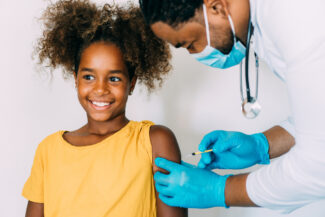
National Influenza Vaccination Week (NIVW) is recognized in December to bring awareness to flu season and the importance of getting your influenza (flu) vaccine for people aged six months and older. The flu can cause serious complications for those who are at higher risk, such as young children, older adults, and pregnant women. The flu causes millions of people to get sick yearly, with thousands requiring hospitalization due to complications.
The greatest approach to lower your chance of contracting the flu is to get vaccinated each year, as flu viruses are ever-changing, and immunity to immunization decreases with time. The flu vaccine is proven to prevent the flu and has been demonstrated to lower the risk of flu-related illness, hospitalization, and mortality.
National Immunization Week (NIVW) is a great platform to bring this topic to the forefront and urge everyone to get vaccinated against the flu while focusing on pregnant women, small children, and other high-risk groups. The more people who receive the flu vaccine, the more people will have that extra layer of protection against the flu.
New COVID Strain
COVID-19 swept the world with swift aggressiveness and created a pandemic that most have never seen in their lifetime. As time passed, SARS-CoV-2, the virus that causes COVID-19, has evolved and mutated to form new strains – as most viruses do.
The Centers for Disease Control (CDC) suggests that everyone who is over six months of age receive the updated COVID-19 vaccination, especially those who are at high risk or have a compromised immune system. Vaccinations are the best plan of protection against hospitalization or death related to COVID-19, including long COVID. Long COVID-19 develops after or during an acute infection and can last for months or even years.
The CDC recommends anyone who has not received a COVID vaccination in the last two months to get an updated vaccination during the winter months.
RSV

RSV (respiratory syncytial virus) is a common respiratory virus that typically causes cold-like symptoms and can last about two weeks. RSV can potentially be serious in older adults and young children whose immune systems are not as strong. The RSV vaccine is the best protection against RSV for older adults, while infants and children can take a monoclonal antibody that helps protect against severe RSV.
The CDC recommends people over age 60 get a single RSV vaccine after consulting with their doctor. To protect young children and infants, the CDC recommends the RSV monoclonal antibody for infants or maternal RSV vaccination for pregnant women.
This winter, we are fortunate to have vaccines available for the three most common viruses that cause hospitalizations – influenza, COVID-19, and RSV. People can safely test at home for COVID-19 if they feel they may have been exposed to the virus or are experiencing related symptoms.
Greater Waterbury Imaging Center (GWIC) cares deeply about your overall health and well-being and urges you to immediately contact your primary care physician if you are feeling sick or think you have been exposed to one of these viruses this season. The Holidays are no fun when you have to deal with illnesses. Make sure you are taking the necessary precautions to ensure your Holiday season is filled with good health, love, and family.
GWIC proudly serves its community with compassion through a team of skilled and knowledgeable MRI technologists. We recommend staying current with your vaccinations during the winter months and contact your doctor if you are feeling sick. Contact us to learn more about the MR imaging services we offer.


